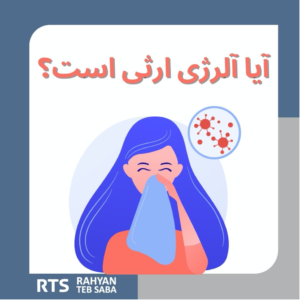
Are Allergies Hereditary?
In addition to other factors, such as diet and environment, genetics may play a role in whether you will develop allergies. This is especially true if someone in your family already has allergies.
Learn more about how allergies can be passed down from parents to children, as well as the causes and risk factors for developing allergies.
Multiple studies have shown that allergies are hereditary, or passed down through genes from parents to their children. Children are 50% more likely to develop an allergy if one of their parents has one, and they are 75% more likely to have allergies if both of their parents have them.
The Link Between Allergies and Genes
Allergies occur when a person’s immune system overreacts to something occurring in their environment. This might include food, medications, pollen from trees, or dander from a pet. For a person with allergies, the body’s immune system reacts and produces immunoglobulin type E antibodies, or IgE, in response to the allergen.
Research conducted on allergies has shown a genetic component, suggesting that they are hereditary. Genetic factors for developing food allergies have also been observed in several studies.
Most recently, genome-wide association studies, or GWAS, in which researchers study the entire human genome and discover genetic information about diseases, has helped shape the understanding of the genetics of allergies, providing further evidence that allergies can be hereditary.
Other Risk Factors for Developing Allergies
Why some people react to an allergen (or proteins that cause allergic reactions) and why others don’t is not fully understood at this time. Studies indicate that both environmental and genetic factors cause common allergies.
While the exact cause of allergies is not fully known, there are some ideas about what causes allergies and their increased prevalence.
Researchers suggest risk factors for developing allergies include:
- Diet
- Environmental changes
- Tobacco smoke exposure
- Viral respiratory infections
- Increased antibiotic usage
- Exposure to allergens in an individual’s environment
Diagnosis and Treatment of Allergies
The diagnosis and treatment of allergies often depends on the type of allergy being treated.
Diagnosis of Allergies
The first step when an allergy is suspected is providing a detailed medical history to your healthcare provider. Allergy testing may then be ordered to identify possible allergy triggers.
The most common tests to diagnose allergies include:
- Blood tests: An individual’s blood is tested for the presence of IgE antibodies.
- Skin prick test: These tests prick the skin with a small amount of the allergen at the tip of a small needle. The skin’s reaction is measured to indicate whether there is a response to the allergen.
- Radioallergosorbent test (RAST): RAST is an older type of allergy test that checks for IgE antibodies to a specific allergen in the blood. ImmunoCap is a newer and preferred test for measuring circulating IgE antibodies to specific allergens in order to identify your allergy triggers.
- Oral food challenge tests: This test involves introducing a small amount of food while in a medical office under physician supervision to monitor for a potential allergic reaction.
Managing and Preventing Allergies
The easiest way to manage and prevent allergies and improve quality of life is to avoid contact with the allergen as much as possible. This can be difficult, especially with airborne allergies.
For many allergies, especially life-threatening ones, it’s important to have epinephrine devices (EpiPens) on hand at all times in case of accidental exposure.
